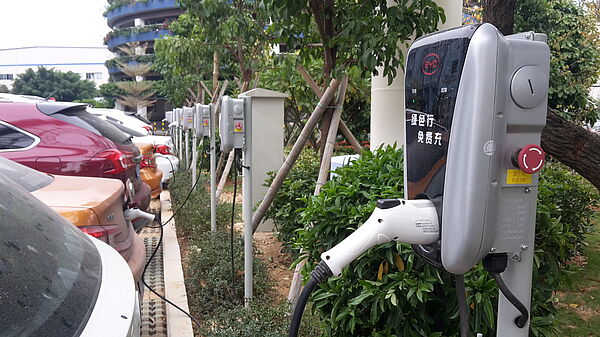E-MetropoLIS
Evaluation of publicly accessible charging infrastructure in metropolitan areas – Derivation of recommendations for action from Hamburg and Shenzhen

E-MetropoLIS
The ongoing project "E-MetropoLIS" is supported by the Federal Ministry of Transport an Digital Infrastructure and coordinated by NOW (National Organisation Hydrogen and Fuel Cell Technology).
Supporting the upsurge in the electro mobility market
Environmentally sound urban and transport related development that minimizes pollution has the potential to effectively change mobility structures and mobility behavior. Technological progress within the field of electro mobility and specifically its charging infrastructure in addition to urban planning measures such as transit oriented development (TOD) or the digitalization of transport systems are key elements to meeting the aims of municipal climate policies. This is especially important with regards to the continuous growth of cities and associated problems. Additionally, climate change requires significant reductions of CO2 emissions and local air pollution - electro mobility can help conquer both challenges. However, electro mobility is still in its initial phase, far from being able to fulfill the expectations projected upon it. Yet, developments in China, especially in Mega Cities like Shenzhen and Shanghai, demonstrate that the large scale implementation of charging infrastructure is possible. Even though the pressure on cities in Germany, such as Hamburg, is not as strong as it is in China, the obligation to reduce greenhouse gas emissions and pollution in the realm of transportation remain. By taking a closer look at China, its actions and policies, E-MetropoLIS will contribute to broadening the knowledge base about what is necessary to change the transport system from fossil fuels to renewables.
General objective
E-MetropoLIS takes an in depth look at Chinese experiences concerning the upsurge in the electro mobility market including measure, funding instruments and implemented solutions and their effects, especially regarding public transport (focus: busses), taxicabs as well as private vehicles. The primary focus is on the development and operation of public and publicly accessible charging infrastructure. Since Shenzhen, in this regard, is quantitatively more advanced than Hamburg, it is expected to gather results that help foster and influence the development in Hamburg and Germany.
Based on a comparison between Chinese strategies, instruments and measures for the integration of charging infrastructure and practice in Hamburg, the aim is also to optimize an already existing location-based tool in Hamburg for distributing charging infrastructure in municipalities . Recommendations will also be made for how to further develop the electro mobility market at the municipal, state and federal level in Germany.
Partners
ARGUS Stadt und Verkehr – Rothfuchs | Buch | Partnerschaft mbB Hamburg,
Intelligent Transport Systems (ITS) Projektmanagement-Office (PMO) of the City of Hamburg at Hamburger Hochbahn AG,
Tsinghua University, Graduate School at Shenzhen (THUSZ),
China Automotive Technology and Research Center Co., Ltd. (CATARC)
Contact
wolfgang.dickhaut@hcu-hamburg.de | Thomas Prill
Duration
May 2019 - July 2021
Founding institution

Federal Ministry of Transport an Digital Infrastructure,
coordinated by NOW (National Organisation Hydrogen and Fuel Cell Technology)



